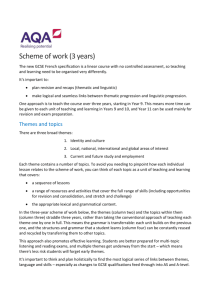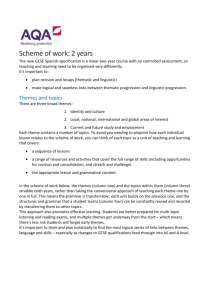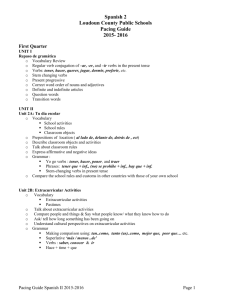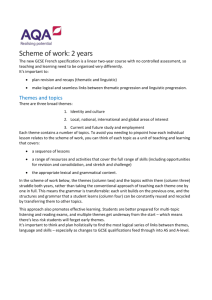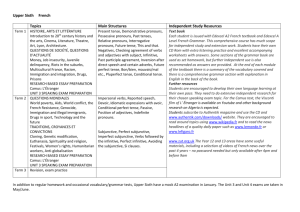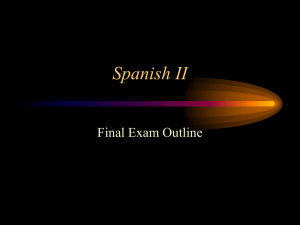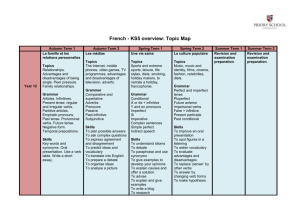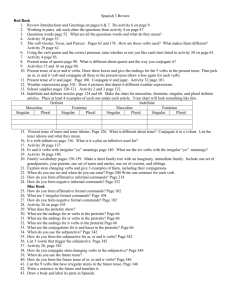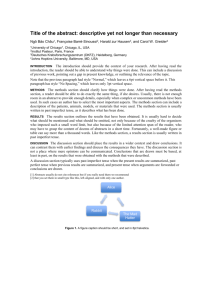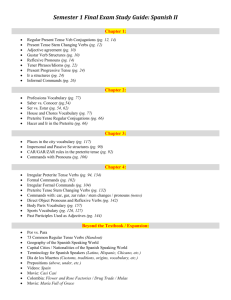The new GCSE Spanish
advertisement
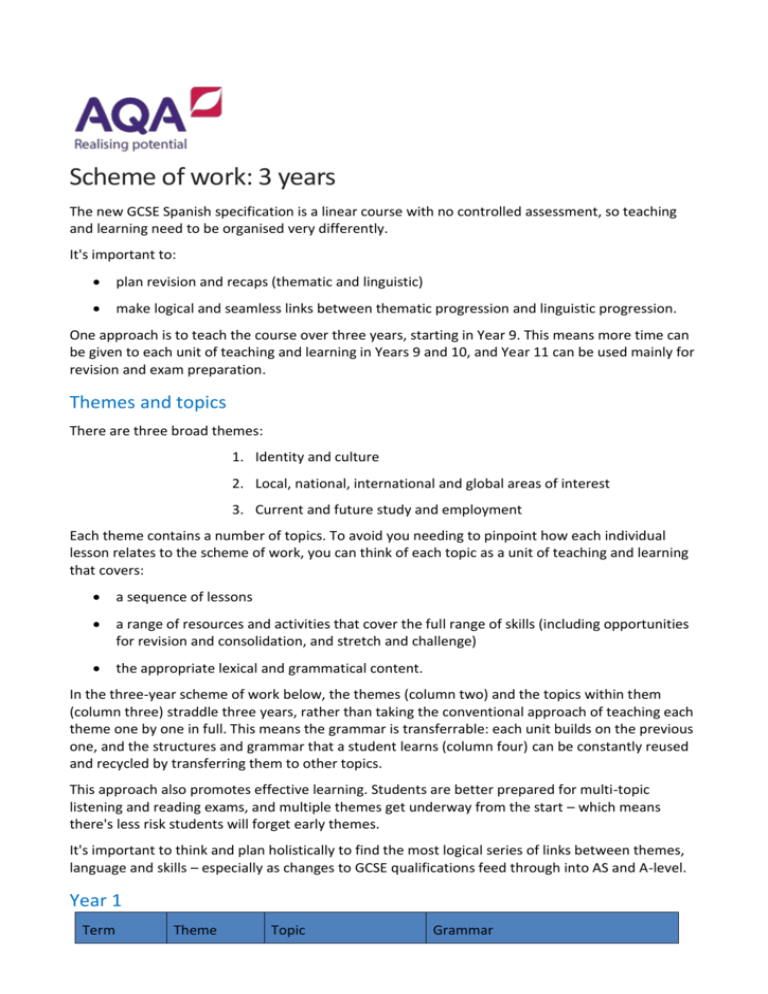
Scheme of work: 3 years The new GCSE Spanish specification is a linear course with no controlled assessment, so teaching and learning need to be organised very differently. It's important to: plan revision and recaps (thematic and linguistic) make logical and seamless links between thematic progression and linguistic progression. One approach is to teach the course over three years, starting in Year 9. This means more time can be given to each unit of teaching and learning in Years 9 and 10, and Year 11 can be used mainly for revision and exam preparation. Themes and topics There are three broad themes: 1. Identity and culture 2. Local, national, international and global areas of interest 3. Current and future study and employment Each theme contains a number of topics. To avoid you needing to pinpoint how each individual lesson relates to the scheme of work, you can think of each topic as a unit of teaching and learning that covers: a sequence of lessons a range of resources and activities that cover the full range of skills (including opportunities for revision and consolidation, and stretch and challenge) the appropriate lexical and grammatical content. In the three-year scheme of work below, the themes (column two) and the topics within them (column three) straddle three years, rather than taking the conventional approach of teaching each theme one by one in full. This means the grammar is transferrable: each unit builds on the previous one, and the structures and grammar that a student learns (column four) can be constantly reused and recycled by transferring them to other topics. This approach also promotes effective learning. Students are better prepared for multi-topic listening and reading exams, and multiple themes get underway from the start – which means there's less risk students will forget early themes. It's important to think and plan holistically to find the most logical series of links between themes, language and skills – especially as changes to GCSE qualifications feed through into AS and A-level. Year 1 Term Theme Topic Grammar Term Theme Topic Autumn half-term 1 Identity and culture Me, my family and friends Autumn half-term 2 Spring half- Local, national, international and global areas of interest Current and Grammar Relationships with family and friends Home, town, neighbourhood and region My studies tener, ser and estar present tense (see Ser or estar: Lesson activities and Ser or estar: Task 3 slide) possessive adjectives adjective agreement rules reflexive verbs casarse/enfadarse/llevarse bien con comparatives más que/menos que adverbs of frequency regular verbs in present tense direct object pronouns interrogative words such as quién, cómo, cuántos, qué, cuándo hay prepositions use of unos, unas for ‘some’ poder + infinitive expressions of quantity irregular verbs ir/hacer los que/las que + verb gustar enhancing descriptions using que demonstrative adjectives: este, esta, estos, estas, ese, esa, esos, esas interrogatives dónde and por qué tener que/deber + infinitive Term Theme term 1 future study and employment Spring halfterm 2 Summer half-term 1 Summer half-term 2 Identity and culture Identity and culture Identity and culture Topic Grammar Free-time activities Music Cinema and TV Free-time activities Food and eating out Sport Customs and festivals in Spanish-speaking countries/ communities hay que + infinitive (compulsory subjects) porque to express reasons perfect tense regular verbs (escoger/decidir/dejar options) two verbs together eg ir a/ esperar/gustar más comparative and superlative in expressing opinions about subjects use of tú and usted in informal/formal exchanges consolidation of present tense including irregular verbs salir, querer, preferir, ver, dar extend range of two verbs together adverbs such as por lo general/normalmente clauses introduced by cuando and si perfect tense using regular and common irregular verbs lo que he hecho este fin de semana/esta mañana) simple opinion statements to express how it was (illustration of the imperfect) disjunctive pronouns such as conmigo and para mí preterite tense rules – regular and common irregular verbs (ser, estar, tener, hacer, ir) reflexive verbs in preterite; perfect and imperfect tenses together describing a past Term Theme Topic Grammar event/festival; actions and opinions Year 2 Term Theme Topic Autumn half-term 1 Current and future study and employment Life at school/college Local, national, international and global areas of interest Travel and tourism Autumn half-term 2 Spring halfterm 1 Current and future study and employment Education post-16 Grammar transfer deber/poder/hay que/querer to school rules context quantity words mucho/demasiado/bastante (including with plurals) consolidation of preterite tense (see Holidays: the preterite tense: Teaching notes) extension of imperfect tense (see Holidays: the imperfect tense: Teaching notes) consolidation of preterite and imperfect tenses (see Holidays: the preterite and imperfect tenses: Teaching notes) sequencing words, expressions and phrases antes de/después de haber etc/mientras/desde hace/acabar de developing greater complexity in spoken and written accounts of past events or experiences weather expressions with hacer possessive pronouns mío etc Use of lo in lo que and lo + adjective future tense introduced for eg Term Theme Topic Grammar future study plans Spring halfterm 2 Summer half-term 1 Summer half-term 2 Local, national, international and global areas of interest Identity and culture Identity and culture Social issues building on si clauses with present and future more complex two verb structures (tener la intención de/tener ganas de/tener el derecho de) recap on deber/tener que/hay que + infinitive and introduce conditional forms – affirmative and negative es mejor/sería mejor/más vale/más valdría negative nunca full explanation of imperfect tense to allow statements and opinions about previous health habits revisiting adjectives to describe and use of que to describe ideal partner and enhance descriptions use of gerund revision of future tense to outline future plans direct and indirect object pronouns revision of past tenses to recount how social media have been used; or life before technology gracias a/sin/con enhanced statements of possibility including permitir, es posible que + subjunctive Healthy/ unhealthy living Marriage/partnership Technology in everyday life Social media Mobile technology Year 3 Term Theme Topic Autumn Local, Global issues Grammar modal verbs linked to Term half-term 1 Autumn half-term 2 Spring halfterm 1 Spring halfterm 2 Theme national, international and global areas of interest Topic Local, national, international and global areas of interest Social issues Local, national, international and global areas of interest Global issues Current and future study and employment Career choices and ambitions The environment Charity/ voluntary work Homelessness/p overty Summer half-term 1 End of course examination focus Summer half-term 2 End of course examination focus Grammar behaviours (must do/can do/should do/could do etc) si sentences revised for outlining consequences of actions querer + infinitive querer que + subjunctive para que + subjunctive imperfect continuous si fuera…/si tuviera que… with conditional completions hay que + infinitive and es importante que + subjunctive verbs of emotion + subjunctive (me preocupa que/me molesta que) enhanced statements of possibility including subjunctive after conjunctions of time (cuando) use of quisiera to express ambitions pluperfect tense perspective Differentiation The grammar progression above might be over-demanding for some students. For each language point and grammar area, you'll need to decide the appropriate scope for each group of students – for example, you might need to be selective about teaching modal verbs (puedo, se puede…) if the full conjugation proves too demanding. Similarly, very able students need to be stretched and challenged. This scheme of work is not prescriptive: it's a programme that you can use to find the level that's right for your students.
